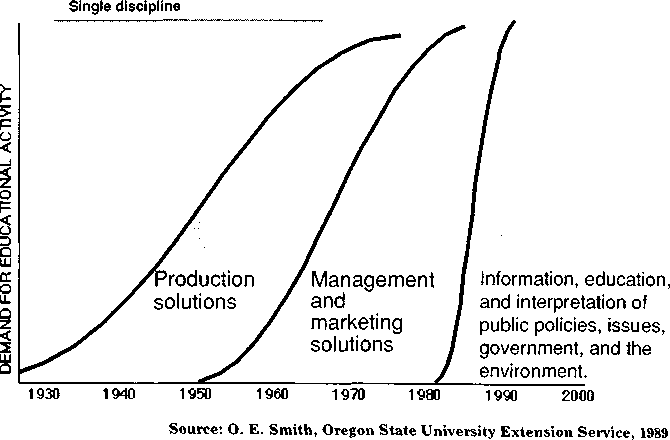reach educational goals. Furthermore, others say if you know proc-
ess, you don’t need to be an expert in the subject being discussed.
I would like to suggest that extension educators need to balance
their use of process skills and educational expertise in order to have
optimum outcomes in public policy education. While sitting in a
Family Community Leadership meeting with volunteers and staff
members, a question was asked, “Now, what process is occurring
here?” Wayne Shull, the staff member who was the presenter, did a
quick analysis of what process was taking place. My thought was,
“My, he’s smooth, we weren’t aware of the process techniques
being used.” When process is obvious it may become annoying and
distract from the issue being discussed.
Demands for extension education are changing. 0. E. Smith, di-
rector of the Oklahoma State University Extension Service, uses this
diagram (Figure 1) to illustrate current expectations of extension ed-
ucation. Early in the century, expectations for agricultural extension
programs centered on production solutions and usually involved a
single discipline in the solution. During the boom years of the 1950s
problems became more complex and required expertise that crossed
disciplines. In agriculture, this was accomplished by marketing and
management education as well as education about production. Basic
production, marketing and management education are needed for
Figure 1. The Changing Demand for Extension Education
Interagency cooperation
Interdisciplinary cooperation

122
More intriguing information
1. The name is absent2. TOMOGRAPHIC IMAGE RECONSTRUCTION OF FAN-BEAM PROJECTIONS WITH EQUIDISTANT DETECTORS USING PARTIALLY CONNECTED NEURAL NETWORKS
3. The name is absent
4. The name is absent
5. The name is absent
6. The name is absent
7. Do imputed education histories provide satisfactory results in fertility analysis in the Western German context?
8. The name is absent
9. Pricing American-style Derivatives under the Heston Model Dynamics: A Fast Fourier Transformation in the Geske–Johnson Scheme
10. Political Rents, Promotion Incentives, and Support for a Non-Democratic Regime